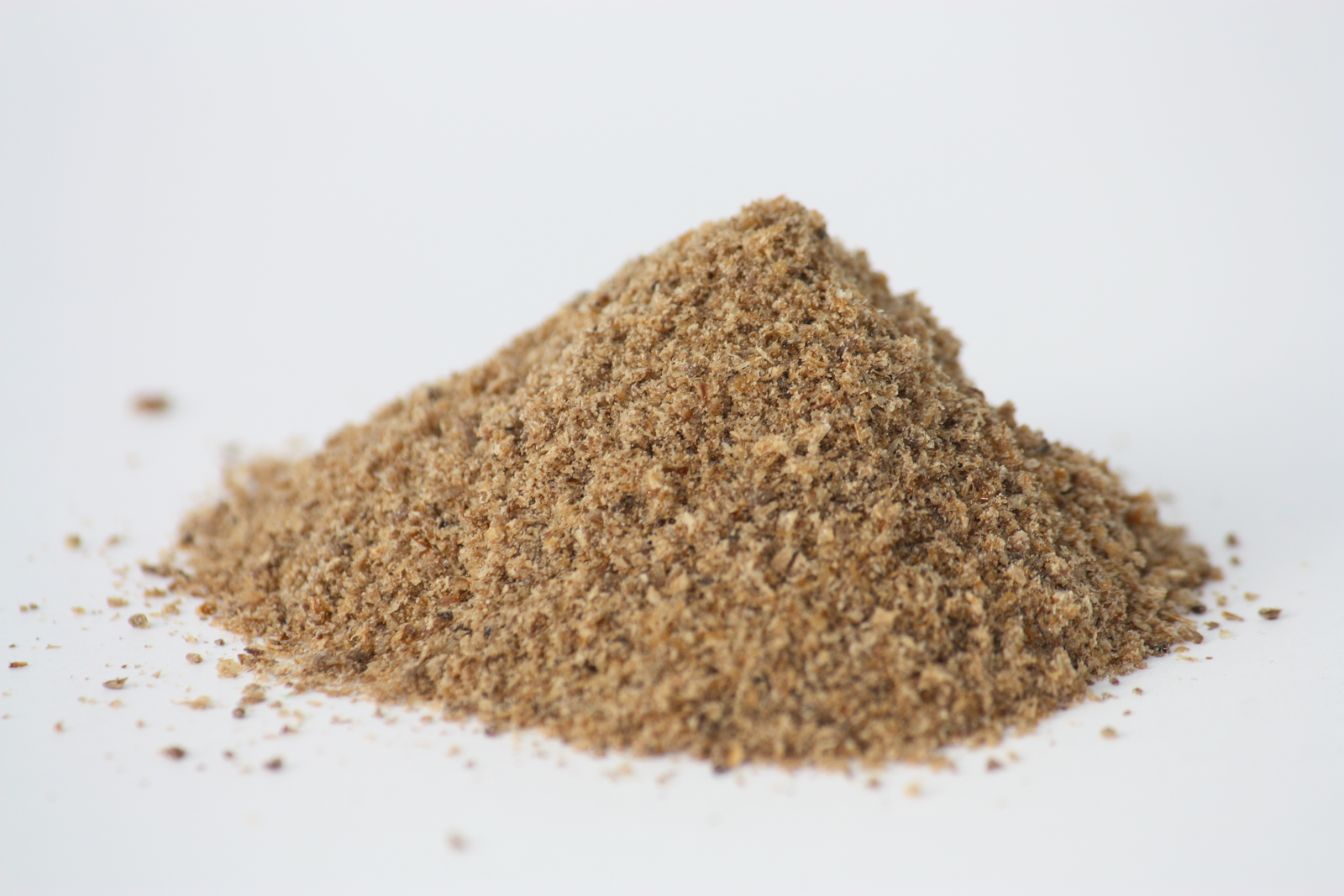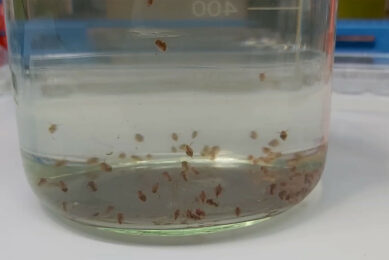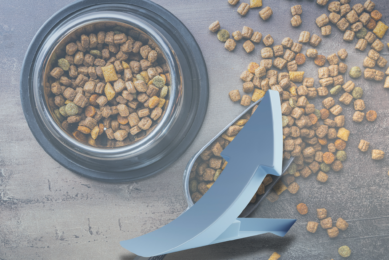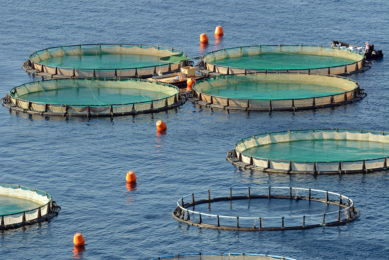Mealworm meal shows promise for fish

Many feed trials with insects for use in livestock diets focus on the black soldier fly. However, new insights show better performance results with mealworms. Here we share some of the latest insights concerning a mealworm meal called TMP and its results in rainbow trout and the way it reacts to the feed extrusion process.
Over the years, many studies have shown an increasing interest in using insect meal in animal feed. An overview made by Makkar et al. (2014) indicates that replacing fishmeal with different insect meal in different animal feed did not show any adverse effects on animal performance and health, at least not when replacing a maximum of 50% of the fishmeal. At the same time, this means that – so far – no trials have shown any effects of better animal performance when insect products are used in the diet. The majority of animal trials focus on the use of black soldier fly (BSF) meal, as BSF is the most used insect species in the neo-insect industry so far. However, many other species look promising for use in animal feed as well. In 2014, the French company Ynsect conducted a deep screening of 15 insect species on more than 30 parameters, which led to the selection of the mealworm (Tenebrio molitor L.) to be the first on the animal feed market, as it achieved the best overall score. The parameters used in the screening were divided into four groups: Supply: access to consistent, authorised and large volumes of raw material to feed insects (> 200 kT/year), without quality and safety issues. Technology: possibility to fully automatise insect farming and processing to obtain an insect meal at a price that is competitive with fishmeal while ensuring the highest quality standards. Composition: insects’ content in proteins, lipids, chitin, amino-acids, etc., in order to obtain the best insect meal with a composition that is most similar to fishmeal. Usage: market use (feed, food, chemicals, etc.), price, volumes, quality, etc. In this last category, besides acceptance, animal performance is crucial.
Benefits for animal performance
A study was undertaken at the Sparos facilities in Portugal to evaluate the efficacy of graded incorporation levels of insect meal made from Tenebrio molitor larvae (Ynsect TMP-Y465, see box) with respect to growth performance, body composition and apparent digestibility of nutrients in rainbow trout. The trial comprised five dietary treatments: a control diet (CTRL) containing 25% fishmeal and four test diets Y5, Y7.5, Y15 and Y25 in which fishmeal was replaced with Ynsect TMP-Y465 meal at 20, 30, 60 and 100%, respectively. Diets were isonitrogenous (CP 48.5%), isolipidic (CF 22.7%) and isoenergetic (GE 23.2kJ/g). Diets were tested in triplicate groups of 35 trout, with a mean initial body weight (IBW) of 5.0 g, over 90 days. The diet composition is shown in . At the end of the trial, the incorporation of TMP-Y465 meal at 5, 7.5, 15 and 25%, with the concomitant reduction of fishmeal, led to a stepwise significant increase in final body weight (P<0.05): 30% increase of fish growth when 100% fishmeal was replaced by tmp-y465. all diets with tmp-y465 meal showed a significant improvement of sgr, fcr and per values (p><0.05) (). no detrimental effect on palatability were observed. a lower fcr (-18%) and higher growth (+30%) in fish highlighted the better nutritional and metabolic adequacy of the diets.
The various incorporation levels of Ynsect TMP-Y465 meal had no effect on the whole-body composition of fish nor on the ADC of dry matter, protein, fat, phosphorus and energy (P>0.05). Protein, phosphorus and energy retention was significantly increased (P<0.05) in trout feed diets containing ynsect tmp-y465 meal. the protein efficiency could be explained by the protein composition: 75% of the soluble proteins are peptides below 12 kda. the profile is then similar to a protein hydrolysate, while being more affordable when production is at full scale. in general, the defatted insect meal (ynsect tmp-y465) could effectively replace 100% of fishmeal in the diet of juvenile rainbow trout with positive effects on the overall growth performance. another trial was carried out on broilers over a period of 34 days in which broilers were fed a diet containing 10% of tmp-y265. the results also showed great benefits: 2% increase in carcass yield – without mortality increase – and 15% less water consumed by broilers, which led to cleaner litter. behaviour of the product in extruder another study was undertaken at sparos, parallel to growth trials, to evaluate the effect of graded incorporation levels of insect meal from tenebrio molitor larvae (ynsect tmp-y465) on the extrusion process itself.>
In particular, the stability of vitamins (A, B6 and B9) throughout the various feed processing steps was assessed. Diets were manufactured by extrusion (pellet size: 3.0 mm) in a pilot-scale twin-screw extruder (Clextral BC45) with a screw diameter of 55.5 mm and temperature range of 119-123 ºC. Upon extrusion, all batches of extruded feeds were dried in a vibrating fluid bed dryer and oil was added by vacuum coating. During the extrusion process, increasing levels of TMP-Y465 meal resulted in a 10% reduction of SME (Specific Mechanic Energy) per tonne extruded. Pellet hardness and water stability after 30 minutes of immersion were not affected by the graded levels of TMP-Y465 meal (P>0.05). Vitamin A losses during processing were low (2-3%) and were little affected by the incorporation of TMP-Y465 meal. However, the inclusion of TMP-Y465 meal at 15 and 25% tended to reduce significant processing losses of vitamin B6 and B9 (Figure 2).
Quality is key for insect production
TMP can be produced anywhere worldwide in a local production scheme, with no seasonality. This is possible thanks to the unique, fully automated and robotised technology of Ynsect in a so-called YnFarm®. One YnFarm entails the whole process: from insect farming at all stages (hatchery, egg laying and larvae growth) to slaughtering and processing into TMP and other products. The downstream processing follows the 142/2011 European regulation through thermal mechanical and biological treatments. As quality is a top priority at Ynsect, every single YnFarm has to follow ISO 9001 and GMP+ standards, wherever the plant is located. Innovative technologies have been deployed to monitor insect health and quality throughout the process via a HACCP scheme, from raw ma-terial reception to insect growth monitoring and from clean fresh larvae harvested for slaughtering to final packaged TMP.
The first YnFarm will be opened in the spring of 2016 in France and will be dedicated initially to the pet food market, as it is so far the only authorised market in Europe. As soon as European regulation gives the green light for the use of insect meal in aqua feed (which is expected to come soon, following EFSA’s positive report, published in 2015), other YnFarms will be built to supply the aquafeed market, and the livestock feed market further down the road, with the required large volumes at a competitive price and high quality.
Conclusion, increase in body weight and decrease of FCR
TMP is a sustainable source of high quality proteins produced from mealworm. The graded incorporation levels of TMP had no effect on the whole-body composition of trout and broilers. One hundred percent replacement of fishmeal by TMP-Y465 showed a 30% increase in body weight and 18% decrease of FCR. Ten percent incorporation of TMP-Y265 into broiler diets increased filet and carcass by 2% and decreased water consumption by 15%.











